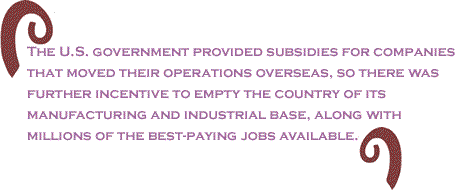There
never was a great cry from the American people for what
we now call free trade in a �global economy.�
The
only persistent call came from Corporate America, from
commodity traders, from banks, from investment houses,
from manufacturers (the shrinking base that existed),
from everyone who had a stake in the exploitation of natural
resources or the production of low-wage workers in other
countries.
It
was the most powerful economic entities in the nation
that called for �free trade� and, over the years, they
convinced enough of the people that free trade was a good
thing and that, if a worldwide system of free trade were
accomplished, all would benefit.
It
was the powerful corporations that called for opening
up the world to trade on their terms, and those terms
included the demands that factories in the developing
world (where most of them eventually went for their goods)
produce at the lowest possible cost, which meant that
workers in those countries would be paid slave wages.�
And, in the case of the U.S., the government was manipulated
to look the other way, when threats were made to government
leaders or bribes were paid to keep production costs at
rock bottom.
 Corporate
America developed such power that it influenced Congress
to embrace the �free trade� agreements all around the
world.� The U.S. government, in fact, provided subsidies
for companies that moved their operations overseas, so
there was further incentive to empty the country of its
manufacturing and industrial base, along with millions
of the best-paying jobs available.
Corporate
America developed such power that it influenced Congress
to embrace the �free trade� agreements all around the
world.� The U.S. government, in fact, provided subsidies
for companies that moved their operations overseas, so
there was further incentive to empty the country of its
manufacturing and industrial base, along with millions
of the best-paying jobs available.
How
did corporations get to be so powerful that they outstripped
the power of the people in what was once a democratic
republic?� The frauds included more than just free trade,
such as the continued attack on workers� rights to a union,
the continuing lowering of wages, the evaporation of benefits
and pensions, and unpaid-for wars, to name a few�many
catastrophes that have been visited upon American workers.�
How did they achieve such preeminence that they could
perpetrate such massive thefts and frauds?
We
were reminded recently how corporations came to rule America
as we reflected on the recent death of Richard Grossman,
co-founder of the Program on Corporations Law and Democracy
(POCLAD), at the age of 68.� Grossman was a man who was
long engaged in the struggle to free the people from the
overpowering influence of corporations.�
POCLAD
is a small group of about a dozen men and women who for
two decades slowly and steadily began to make Americans
aware of the influence of Corporate America on their lives.�
He and the others taught the history of undue corporate
influence, stretching back to the beginning of the republic.�

It
was not last year�s U.S. Supreme Court decision in the
Citizens United case alone that gave corporations
the rights of citizenship, but precedent had been set
in a progression of decisions and other official actions,
but they were given a great boost in 1886, when the Supreme
Court ruled in the case of Santa Clara County v. Southern
Pacific Railroad, that corporations were natural persons
under the law.
According
to a pamphlet co-written by Grossman and Frank T. Adams
titled, �Taking Care of Business,� Supreme Court Justice
William O. Douglas 60 years later wrote of the case, �There
was no history, logic or reason given to support that
view.�
Even
though Santa Clara was a fraudulent ruling, from
that time on, corporations were seen as having many of
the rights of a citizen, such as access to rights under
the Bill of Rights.� In that era, while giving corporations
citizen rights, some judges went so far as to rule that
trade unions were civil and criminal conspiracies.� American
workers found it difficult enough to organize to protect
themselves and their families, but this attitude about
unions prevailed in legislative halls and the judiciary
well into the 20th Century and made organizing
even more difficult.
This
kind of corporate power was something that the founding
fathers feared might happen, if corporations were not
held under tight control, so they made sure that the issuance
of a charter of incorporation was among the most serious
undertakings and they gave the control of those charters
to the various state legislatures, which were thought
to be closer to the people.
The
founders were fearful of the untrammeled power of the
budding corporations (they had experienced the great trading
companies of the imperial powers) to the extent that Thomas
Jefferson early in the country�s history wrote in a letter,
�I hope we shall crush in its birth the aristocracy of
our moneyed corporations, which dare already to challenge
our government to a trial of strength and bid defiance
to the laws of our country.�� They gave state legislators
the power to issue corporate charters and the power to
regulate corporations, to detail what they were allowed
to do and what they were prohibited from doing, and the
power to revoke the charter and distribute the assets
among the shareholders.
Finally
though, last year, the U.S. Supreme Court gave corporations
what they had been seeking for generations, when the justices
ruled that corporations were, indeed, citizens and that
their money was speech, under the First Amendment.� The
power of corporate money finally overcame the regulatory
structures set up by the founders and made America�s headlong
plunge toward oligarchy possible.
Richard
Grossman sounded the alarm through POCLAD, which set up
�conversations� about corporations and democracy around
the country in the 1990s�their way of educating participants,
believing that small numbers of people could move others,
to bring the realization to Americans, in general, that
corporations are now in charge.� At the beginning of the
republic, Grossman noted, laws and structures were set
up to benefit a propertied class, but now, the control
has passed to a corporate class, which many call Corporate
America.

POCLAD
calls for the elimination of �corporate personhood,� which
means that the corporation needs to be recognized for
what it is, a �legal fiction,� and that no corporation
has the rights of a citizen under the U.S. Constitution
or the Bill of Rights.� Among other things, the �Occupy�
movement addresses this wrong and there are other efforts
under way (such as movetoamend.org) to overturn
Citizens United legislatively and constitutionally,
to do exactly what Grossman and POCLAD have been working
toward for a couple of decades.
In
noting his passing, the Community Environmental Legal
Defense Fund, for which he worked for a time, said, �While
he didn�t believe that many organizations correctly framed
the problem that we face - and hence, the solution to
that problem - strains of his thinking and strategy continue
in the organizations which worked with him. Echoes of
it can also be found in the Occupy movement, in addition
to other groups. But messaging and bumper stickers were
not his work. Rather, it was his unfailing, uncompromising
commitment to uncolonizing our brains (as the first step
to figuring our way out of this mess) which will remain
his legacy.�
The
influence of endless amounts of corporate money has corrupted
the political system, the regulatory system (for food,
water, air, the environment, and jobs, in general), the
education system, and the means by which the people should
be informed, such as television, newspapers, mass-marketed
magazines, and radio.� That�s what Richard Grossman was
trying to say.� It was not just �free trade� that has
been the fraud of the corporatist era, but it just
may be the lynchpin of corporate control of all of our
societal systems.
So
pervasive has been the influence of Corporate America
that average citizens years ago took to spouting their
line for years without thought, and politicians have taken
up their cry as if it were their own.� For example, Citizens
for Tax Justice (CTJ) recently noted an example of a politician
mouthing their creed without thought:� �In October, South
Carolina Governor Nikki Haley suggested that gradually
repealing the state�s corporate income tax should be a
priority for lawmakers in 2012. Haley�s idea was alarming,
but hardly surprising: in the past year, governors in
Arizona and Florida have proposed similar plans, and lawmakers
in a number of other states have moved to enact expensive
new corporate tax breaks or reduce the corporate tax rate.
Noticeably absent from the policy debates in these states,
however, has been any discussion of whether businesses
in each of these states are currently paying the corporate
income tax to begin with.�

Such
is the state of our politics, when no thought is given
to reality.� CTJ, in a recent report, noted that scores
of corporations paid no state income taxes in one or two
of the years 2008-2010.� That reality never dawns on the
ideologues who perpetually defend the small minority against
the 99 percent (the people).� It�s why, to a great degree,
only about half of the electorate votes in any given election.�
They feel that their participation, even just to cast
a vote once in a while, does not make any difference.�
What that small number of corporations failed to pay to
states amounted to some $47 billion.� That amount would
make a considerable dent in the �holes� in various state
budgets.� Yet, Corporate America and their politicians
are asking for more �tax relief� and their minions in
Congress and the state houses are jumping to comply.
The
latest manifestation against the rule of the few is the
�Occupy� movement.� A long line of individuals and organizations
have preceded them, starting with the union movement,
the civil rights movements, the anti-poverty organizations,
community groups, and many more.� Most of them have functioned
with little money, so it always is a constant struggle
to counterbalance the power and wealth of Corporate America.�
The
struggle against the plutocrats has been a long one in
America, but the sleeping giant is beginning to awaken.�
Even if the 1 percent hasn�t noticed, the 99 percent is,
indeed, the majority and they will express their will
in an intelligent way very soon.� That�s why the Occupy
movement will not be going away soon, even if the encampments
are attacked and destroyed by mayors and their police.�
As most of us have always known, there are more of us
than there are of them and justice will prevail.
Click
here
to read any of the commentaries in this series

BlackCommentator.com
Columnist, John Funiciello, is a labor organizer and former
union organizer. His union work started when he became
a local president of The Newspaper Guild in the early
1970s. He was a reporter for 14 years for newspapers in
New York State. In addition to labor work, he is organizing
family farmers as they struggle to stay on the land under
enormous pressure from factory food producers and land
developers. Click here
to contact Mr. Funiciello.

